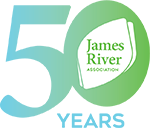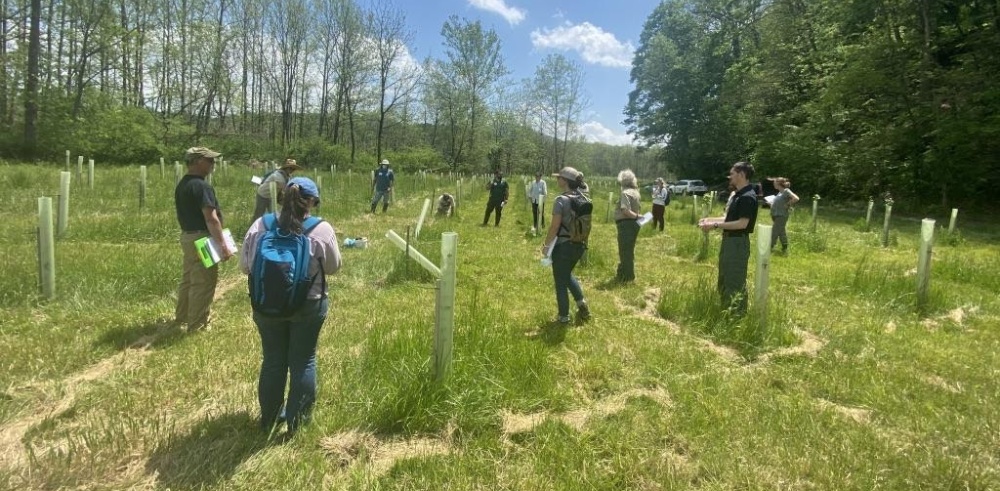Featured Image: Anne Marie Roberts discusses typical establishment phase maintenance tasks for riparian buffers during the CBLP-Buffers maintenance field workshop at Shannon Farms in Afton, Virginia.
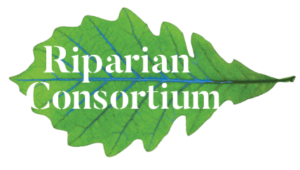 On May 11, 2021, with the assistance and support of the Consortium Knowledge/Research Team and numerous other partners, the Chesapeake Bay Landscape Professional (CBLP) team delivered the final workshop of our pilot riparian buffers certificate course (CBLP-Buffers) . The CBLP-Buffers pilot launched in December 2020, and was delivered simultaneously in Pennsylvania and the Middle James River, over a six month period.
On May 11, 2021, with the assistance and support of the Consortium Knowledge/Research Team and numerous other partners, the Chesapeake Bay Landscape Professional (CBLP) team delivered the final workshop of our pilot riparian buffers certificate course (CBLP-Buffers) . The CBLP-Buffers pilot launched in December 2020, and was delivered simultaneously in Pennsylvania and the Middle James River, over a six month period.
This course was specifically designed to be taught during the pandemic, as we delivered content through a “stretched out” schedule, delivered in two states, with a combination of in-person field workshops and online webinars, supplemented by videos and written materials. Frequently changing Covid-19 restrictions and surging infection rates posed a significant challenge, and throughout the course, we needed to adapt the in-person field classes so that we could continue to meet safely. The December site assessment field workshops were each split into two sections so the groups could be limited to ten people. Even so, a number of people could not attend because they had recently been exposed to or infected with the coronavirus, had a family member exposed, or were not allowed to travel, so we held a make up session online to accommodate those participants.
We tapped a stellar cast of experienced buffer professionals from across the region to help design and teach the course. Our thanks go to this group of partnering organizations, private companies and state agencies that all contributed to the pilot, including: the James River Association (JRA), the Alliance for the Chesapeake Bay, Virginia Department of Forestry (DOF), Stroud Water Research, Conservation Services, Penn State Extension, LandStudies, the City of Lancaster, the Chesapeake Bay Foundation, Blue Ridge PRISM, Virginia Tech Extension, Native Creations Landscape Services, and Hirschman Water & Environment. We also released these trainings in compliment to a video series produced by the Alliance for the Chesapeake Bay on buffer design, installation, and maintenance for professionals, available to watch on their YouTube channel.
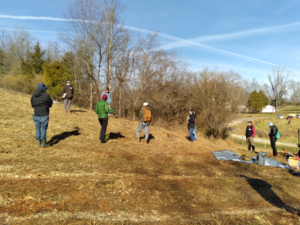 The riparian buffer sites used for the site assessment, planning, site preparation/installation and maintenance planning modules were large in scale, and predominantly rural. The Middle James sites included conversions of cow pasture and hay crop land, and a large residential/institution buffer restoration/expansion project. Pennsylvania sites included a municipal site and former crop land. Over 40 participants from Virginia, Maryland, Pennsylvania, and New Jersey, ranging from experienced buffer professionals to buffer newbies, enrolled. Sixteen members of the cohort were certified Level 1 or -2 CBLPs, 11 Virginia participants were Consortium scholarship recipients, one received a RISE scholarship through a Wetlands Watch workforce development grant, and three were recipients of Penn State Extension scholarships. Like all CBLP trainings, participants and trainers engaged in an interactive exchange of knowledge, experience, activities, and ideas to learn from each other and advance everyone’s understanding of barriers to and best practices for buffer success.
The riparian buffer sites used for the site assessment, planning, site preparation/installation and maintenance planning modules were large in scale, and predominantly rural. The Middle James sites included conversions of cow pasture and hay crop land, and a large residential/institution buffer restoration/expansion project. Pennsylvania sites included a municipal site and former crop land. Over 40 participants from Virginia, Maryland, Pennsylvania, and New Jersey, ranging from experienced buffer professionals to buffer newbies, enrolled. Sixteen members of the cohort were certified Level 1 or -2 CBLPs, 11 Virginia participants were Consortium scholarship recipients, one received a RISE scholarship through a Wetlands Watch workforce development grant, and three were recipients of Penn State Extension scholarships. Like all CBLP trainings, participants and trainers engaged in an interactive exchange of knowledge, experience, activities, and ideas to learn from each other and advance everyone’s understanding of barriers to and best practices for buffer success.
Participants were required to attend all six training sessions to receive the CBLP-Buffers certificate. We are pleased to announce that, despite the attendance issues related to teaching this course during Covid, approximately half of the cohort attended all sessions and earned a CBLP-Buffers certificate (7 Virginia, 1 Maryland, 1 New Jersey, and 9 Pennsylvania) We look forward to welcoming back anyone who missed a class, so they can complete the certificate later this year.
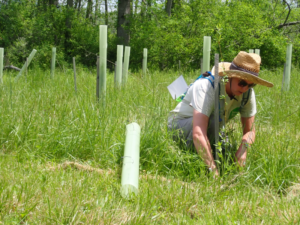 All participants, including trainers, have been surveyed for feedback and we will use this information, combined with our observations from this initial pilot, to evaluate and refine the program and content before the next training session. We plan to open registration for the next CBLP-Buffers cohort in June, with a simplified schedule classes to follow in the fall. We are also planning for a separate urban buffer workshop this fall, tentatively scheduled to be taught online on October 19 and 26, 2021.
All participants, including trainers, have been surveyed for feedback and we will use this information, combined with our observations from this initial pilot, to evaluate and refine the program and content before the next training session. We plan to open registration for the next CBLP-Buffers cohort in June, with a simplified schedule classes to follow in the fall. We are also planning for a separate urban buffer workshop this fall, tentatively scheduled to be taught online on October 19 and 26, 2021.
Shereen Hughes, Virginia Coordinator, CBLP and Assistant Director, Wetlands Watch – shereen.hughes@wetlandswatch.org
Beth Ginter, Executive Director, Chesapeake Conservation Landscaping Council – beth@cblpro.org
